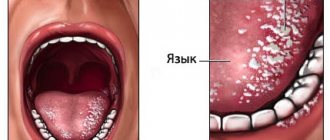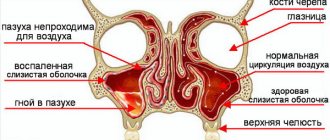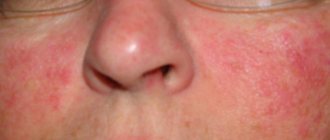During pregnancy, a woman is susceptible to various diseases, as the immune system deteriorates sharply. But the manifestation of symptoms is caused not only by the entry of viruses or bacteria into the body of the expectant mother. For example, nasal congestion and snot during pregnancy can be observed throughout the entire period of bearing a child, and disappear only after childbirth. Such manifestations do not have a cold-like character, but act in the same role as, for example, toxicosis. But there are other reasons for prolonged nasal congestion. In this article we will consider whether such a phenomenon is dangerous, the factors influencing its occurrence, and ways to eliminate it.
Causes
Rhinitis in pregnant women is often diagnosed in the first trimester; it is usually triggered by a viral disease. Women are most susceptible to rhinitis during pregnancy in the autumn and winter, when colds are very common. However, the nature of the origin of such a disease as rhinitis in pregnant women can be not only infectious, but also bacterial. In addition, nasal congestion can be caused by an allergic reaction in pregnant women, since a pregnant woman is more susceptible to allergens.
In addition to the above reasons, a common source of runny nose and nasal congestion during pregnancy are hormonal changes in the female body, which lead to hormonal rhinitis in pregnant women. Hormonal imbalances are caused by pregnancy.
Causes of edema
The expectant mother's body is busy providing nutrients to itself and the baby. This task takes up most of your energy, so even the simplest infection can easily enter the body. Severe nasal congestion occurs precisely for this reason. From the middle of the term, hormonal rhinitis may appear. This is another reason why pregnant women have a stuffy nose. During the period of placenta maturation, estrogen is actively produced, the capillary walls become highly permeable, and severe swelling occurs. At the same time, the nasal passages narrow, and the mucous membrane in this case can be very dry. In the 3rd trimester, swelling that is not associated with a cold appears. The situation gets worse if the air in the apartment is too dry. The epithelium of the mucous membrane becomes thinner, and the secretion begins to be produced with a vengeance. Therefore, in the later stages, nasal congestion often occurs during pregnancy.
The dangers of nasal congestion during pregnancy
Nasal congestion during early pregnancy does not pose any danger if the runny nose is successfully treated during the first 8 weeks. In case of nasal congestion in later stages, a lack of oxygen may occur and, as a result, difficulties in development. If the sources of constant nasal congestion during pregnancy are infections caused by bacteria or viruses, then the most terrible complication is miscarriage.
Hormonal rhinitis during pregnancy does not have absolutely no terrible consequences for either the mother or the child. However, breathing difficulties always cause discomfort to people. For pregnant women, this discomfort is especially dangerous, since lack of sleep caused by nasal congestion leads to a feeling of constant fatigue. This feeling, in turn, is one of the most common causes of colds, since the body is very weakened and, as a result, immunity is reduced.
Breathing exercises for nasal congestion in a pregnant woman
There are special gymnastics that expectant mothers can do during pregnancy. Its essence is as follows:
- Close your left nostril with your finger and slowly draw in air through your right nostril.
- Remove your finger and exhale gently through both nostrils.
- Close your right nostril with your finger and draw in air through your left nostril.
- Exhale through both nostrils.
You need to repeat this exercise 15-20 times.
Another technique that can help is:
- Inhale and exhale through the right nostril (close the left one with your finger first).
- Inhale and exhale through the left nostril (close the right one with your finger in advance).
You also need to repeat this exercise about 20 times.
You need to do breathing exercises for a runny nose several times a day. In total it should take 15 minutes. The main thing is to observe the principle of regularity.
Breathing exercises improve breathing
Symptoms
Symptoms of difficult breathing during pregnancy vary. It depends on the cause of its occurrence. Snot in pregnant women, as previously written, can be caused by several sources. Each type of congestion is characterized by certain symptoms. Constant nasal congestion during pregnancy, which is accompanied by discharge with pus, as well as elevated body temperature, indicates the presence of rhinitis in the patient. In addition, rhinitis in pregnant women is accompanied by symptoms such as a wet cough and constant fatigue.
If the source of breathing difficulties is bacteria, then the pregnant woman will experience discharge with a thicker texture and a greenish tint.
In the case of a special type of nasal congestion - hormonal rhinitis, pregnant women do not observe any discharge, but only feel dryness in the nose and its swelling.
Nasal congestion caused by an allergic reaction during pregnancy is accompanied by thin and clear nasal discharge, as well as swelling and watery eyes.
Determining the cause
Of course, as with any other disturbing symptoms, you must first consult a doctor and determine the cause of the runny nose. And there may be several of them:
- Rhinitis, sinusitis and rhinosinusitis, usually occurring as one of the concomitant manifestations or complications of a cold or acute respiratory viral infection. These diseases are characterized by the following symptoms: fever, copious opaque discharge, sometimes resembling pus, lacrimation, cough, frequent sneezing and general weakness.
- An allergic reaction, sometimes suddenly manifesting itself even in those women who never complained of allergies before pregnancy. In this case, a runny nose is not accompanied by fever, nasal discharge is profuse, but often clear, although sneezing and eye irritation remain.
- The body’s reaction to pregnancy itself, expressed by vasomotor (i.e., vascular) rhinitis or, as it is also called, “rhinitis of pregnant women.” Due to the load on the immune system, changes in blood composition and hormonal levels, a woman’s vascular permeability changes, which is sometimes manifested by swelling of the nasal mucosa. Unfortunately, it cannot be cured. You can only eliminate or minimize the interfering symptoms. As a rule, rhinitis in pregnant women goes away on its own within one to two weeks after birth.
IMPORTANT! Do not confuse vasomotor rhinitis with a runny nose caused by illness.
Drug treatment
Snot during pregnancy or congestion without discharge must be treated in the early stages to avoid complications. To do this, you should seek help from an otolaryngologist. However, even after its prescription, it is recommended to carefully study the annotations for the prescribed medications and, if you find an undesirable column in the contraindications, contact your doctor with a request to change the drug. There are several types of treatment for snot during pregnancy, depending on the symptoms and cause of the disease. If the doctor has diagnosed hormonal rhinitis, then no medications are prescribed in this case.
If a patient has rhinitis caused by infections or bacteria, appropriate treatment is prescribed. In case of self-medication or incorrectly selected medications, drug-induced rhinitis may occur, which can have both acute and chronic forms. An important step in the treatment of rhinitis during pregnancy is rinsing with saline solutions. Thanks to this stage, the nasal mucosa is cleared of secretions and germs. The doctor may also prescribe vasoconstrictor drugs to facilitate breathing, however, this type of medication negatively affects the blood vessels in the placenta, which leads to disruption of the child’s nutrition and blood circulation. It is important to note that the vasoconstrictor nasal spray is addictive.
When diagnosing bacterial congestion, treatment consists of medications aimed at combating bacteria. The doctor even prescribes antibiotics to the pregnant patient, since today many drugs have been developed that do not cause any harm to the fetus. In addition to the tablets, the doctor will definitely prescribe nasal drops with an antibacterial effect, which are safe during pregnancy. If congestion is caused by an allergic reaction to certain factors, then, as a rule, drugs are prescribed that create a protective boundary between the source of the allergy and the nasal mucosa.
Treatment
Nasal congestion during pregnancy can be treated using conservative methods, as well as alternative medicine methods.
Conservative methods
A mandatory procedure is to rinse the nasal passages and sinuses. This is necessary to ensure that the nasal cavity is promptly cleared of residual mucous and purulent contents, as well as dust particles and pathogens. For rinsing, it is recommended to use regular saline solution, a weak solution of table or sea salt, as well as special pharmaceutical solutions (Marimer, Dolphin). The frequency of washing is 3-4 times a day.
For antiseptic purposes, “Star” balm can be used, which should be applied to the wings of the nose. The use of such a product is permissible only after prior consultation with a doctor and in the absence of individual intolerance to the components of the balm.
If a pregnant woman suffers from allergic rhinitis, she is recommended to use Nazaval spray. The action of this drug is based on the creation of a barrier between the mucous membrane of the nasal cavity and various allergens.
Treatment of viral and bacterial rhinitis is carried out under the strict guidance of a medical specialist. In this case, the pregnant woman may be recommended to take antibacterial and antiviral medications. Independent selection and use of such nasal decongestants for pregnant women is strictly prohibited.
If your nose is very stuffy during pregnancy, your doctor may prescribe short-term use of vasoconstrictor drops. The period of use of such funds should not exceed 2-3 days. Otherwise, addiction and a number of other serious consequences may develop. Nazol Baby is considered to be the safest remedy, used to treat nasal congestion in pregnant women and children of all ages. Read more about the use of nasal drops during pregnancy →
An effective addition to drug therapy is physiotherapeutic effects on the sinus area. Unfortunately, such techniques are strictly contraindicated for use in pregnant women.
Folk remedies
Although folk remedies for nasal congestion during pregnancy cannot guarantee a 100% recovery result, however, these methods can serve as an effective addition to the overall conservative treatment plan.
The most common folk remedies for nasal congestion during pregnancy are:
- Inhalations. To do this, a woman should inhale vapors of herbal infusions and boiled potatoes through her nose. To enhance the effect, you can add 1-2 drops of eucalyptus essential oil to the decoction. Read more about this method →
- To relieve inflammation and cleanse the nasal mucosa, it is recommended to instill freshly squeezed Kalanchoe or aloe juice daily, 2 drops into each nasal passage. This nasal decongestant for pregnant women is very effective. If the juice is too concentrated and causes a burning sensation, it can be diluted with a few drops of boiled water.
- Every woman can prepare nasal drops on her own. To do this, you need to mix 25 ml of lemon juice, 40 ml of boiled water and ½ tsp. table salt. The resulting product must be instilled 2 drops into each nasal passage.
- Thermal effects on the sinus area can be achieved by applying a boiled chicken egg wrapped in cotton cloth.
- If the nose is stuffy during pregnancy, and the mucous membrane of the nasal passages dries out, it is recommended to lubricate it with natural honey mixed with vegetable or butter. This product has an anti-inflammatory and nutritional effect.
Self-treatment with folk remedies for nasal congestion during pregnancy should be previously agreed with a doctor.
To prevent nasal congestion in the early and late stages of pregnancy, expectant mothers should adhere to the following rules:
- Avoid close contact with people suffering from influenza and ARVI.
- Limit visiting crowded places.
- Take a regular course of vitamin therapy.
- Observe the work and rest schedule.
- If a woman is allergic, she is advised to completely limit contact with the potential allergen.
- If nasal congestion does appear, the woman should promptly consult a medical specialist.
If the expectant mother did not complain about her health before pregnancy, then in most cases her body will remain resistant to adverse factors. In the absence of chronic diseases, a runny nose and nasal congestion during pregnancy do not pose a danger to the expectant mother.
Author: Ilona Ganshina, doctor, especially for Mama66.ru
ethnoscience
During pregnancy, even doctors are more inclined to treat nasal congestion with folk remedies. A common piece of advice to make breathing easier is to constantly humidify the air in the room where an pregnant woman is. Drinking fluids in large quantities, rinsing the nasal sinuses with saline solutions, as well as inhaling still water filled with minerals - all these recommendations will only benefit pregnant women.
Popular remedies from the field of traditional medicine are warming the feet and warming the nasal septum with heated salt or sand folded in a cotton bag. Also a popular medicine is a solution of onion juice. In addition to onion juice, juice from carrots, lemon and aloe is used as drops.
Nasal massage is an effective remedy in the fight against congestion during pregnancy. This procedure has a certain sequence in which the outer side of the nose is warmed up first, and then the wings of the nose themselves. The final stage is a massage of the nasal septum; the massage process takes ten minutes and must be repeated three to four times a day.
To summarize, we can say that only some types of breathing difficulties can be dangerous for pregnant women, however, with properly selected and timely treatment, all complications can be avoided. It is important to remember that when an illness occurs, a pregnant woman needs complete rest in order to gain strength to fight the disease.
Treatment of allergic rhinitis
Since the body's resistance to allergic agents decreases in pregnant women, nasal congestion may occur as a result of a sensitization reaction. Allergies are also indicated by excessive watery eyes, constant sneezing, redness and rashes on the skin. With this form of nasal congestion, the doctor also prefers the use of local remedies. The safest medications during pregnancy include the following nasal drops and sprays:
We recommend reading:
How to treat sore throat during pregnancy
- Cromohexal,
- Lecrolin,
- Tizin Alerji,
- Cromoghlin.
In the annotation for these drugs, pregnancy is indicated as a contraindication. The doctor evaluates the benefits for the mother and the risk for the health of the child before recommending the drug to the woman in gentle dosages. Nasal antihistamine drops and sprays can also be used as a prophylactic agent during the ragweed flowering season. Only if there is a serious threat to the health of a pregnant woman, allergists prescribe drugs with glucocorticosteroids - Nasonex, Flixonase, Avamis.
Frequent rinsing of the nose with sea salt solutions, increasing air humidity and eliminating the allergen from your usual lifestyle will help get rid of allergic nasal congestion. Decorative pillows, carpeting, and heavy curtains should be removed from the room at least temporarily. The dust that accumulates in them often provokes allergies. Daily wet cleaning without the use of household chemicals will help minimize the likelihood of developing nasal congestion.
Antihistamines are used to treat allergic nasal congestion in pregnant women.
What vasoconstrictors can you use?
During pregnancy, nasal drops for congestion can be used only those recommended by the attending physician. This applies to any nasal drops and sprays, including vasoconstrictors. They can only be used strictly according to the instructions and do not exceed the indicated dosage or instill them more often than necessary (no more than twice a day). During pregnancy, children's Nazivin is often prescribed for up to one year.
Salt solutions (Aquamaris, Aqualor)
Such preparations are made from sea water or saline solution and are considered “natural,” which only increases their popularity. However, in terms of their effectiveness, they are noticeably inferior to other means. The most that saline solutions (Aquamaris, Salin, Aqualor, etc.) can do is moisturize the nasal mucosa and eliminate mucus. The effect, unfortunately, is temporary, since saline solutions have practically no antiseptic properties, which are most important in the treatment of rhinitis. Such remedies can only be used if the runny nose is not a consequence of infectious diseases.
Pinosol
This remedy for the common cold is herbal based; Pinosol contains essential oils (mint, pine, eucalyptus). The drug does not contain harmful substances, acts gently and effectively on inflamed mucous membranes, relieving swelling. Pinosol also heals injured mucous membranes; it can be used for ordinary and chronic rhinitis.
Pinosol should not be used if nasal congestion is caused by a bacterial infection, or if you have sinusitis.
People prone to allergies should approach the use of drops with caution. The duration of treatment should not be longer than 7 days.
Sanorin
It has vasoconstrictor properties, relieves swelling and inflammation, and facilitates breathing. Sanorin is available in several forms - in the form of drops, spray and emulsion. The emulsion lasts the longest; the drops retain their effect for no longer than a couple of hours. Used to treat rhinitis of various origins and prepare the nasal passages before examination. There is no data on the effect of the drug on the fetus during pregnancy, so experts recommend using Sanorin very carefully and in small doses.
Tizin
Pregnant women should not use drugs like Tizin more than once a day. It is better not to use this remedy at all during pregnancy, the only exception being the acute stage of a runny nose when other remedies have failed. Tizin can be used only after consultation with a doctor; the specialist prescribes the dosage strictly individually, taking into account the patient’s health characteristics.
Vibrocil
Used to relieve nasal congestion caused by an allergic reaction. Vibrocil can be used only in consultation with a doctor, despite the fact that pregnancy is not included in the list of contraindications. The product helps remove swelling and reduce the amount of mucus; it is usually used in combination with other antihistamines.
Symptoms and causes
During pregnancy, a stuffy nose can occur due to a common cold. In this case, in addition to congestion, there is a runny nose, weakness, possibly fever, coughing and sore throat. Both congestion and the cold itself need to be treated.
If the cause of congestion is an allergy, severe sneezing, itchy nose, runny nose with liquid clear discharge and lacrimation are additionally observed. Treatment consists of eliminating contact with allergens and rinsing the nose with saline solutions for a long period.
During pregnancy, vasomotor rhinitis or runny nose of pregnant women, caused by swelling of the nasal mucosa under the influence of hormones, is also possible. This type of runny nose often develops after a viral infection and is observed when a pregnant woman is in constant contact with tobacco smoke, strong odors, alcohol, and a reaction appears to certain substances contained in the city air.
A woman complains of nasal congestion, a nasal voice, scanty clear discharge and a feeling of it flowing down the back wall of the throat. Vasomotor runny nose bothers you on one side or the other, and may be more pronounced in a lying position or when turning from side to side. Sometimes even vasoconstrictors cannot eliminate this condition. Treating vasomotor rhinitis is not easy, but it is necessary.
Treatment of nasal congestion with heat: effective thermal procedures
For pregnant women who want to ease their breathing without drops or any other medications, it is recommended to resort to thermal treatment. There are various warming methods.
The simplest of them is to warm your feet around the clock. This is quite simple to do - just put on woolen socks and leave them on throughout the day and night. Boiled eggs wrapped in a not very thick cloth warm up the nasal sinuses more effectively.
They need to be applied to the wings of the nose on both sides simultaneously. Reviews on the Internet regarding thermal procedures are ambiguous, as many women believe that it is impossible to do without medications.
And yet there are users who confirm the effectiveness of using warming methods for congestion and runny nose, which also includes the use of warm salt.
To do this, place the product in a cloth handkerchief and apply it to the sides of the nose for 5-10 minutes. After 1-2 hours you can repeat the procedure. It especially helps in the early stages of pregnancy, when the mucous membrane of the organ is not yet very swollen.
Treatment of congestion with medications: what drops and sprays are allowed for pregnant women?
On forums you can often see messages from pregnant women that begin with the words “help get rid of nasal congestion.” In fact, the forum is “populated” by ordinary people who can only advise medications based on personal experience.
But situations can differ even with the same symptoms. That is why you should always seek help from an experienced doctor, who will only prescribe safe medications after an examination and in accordance with the individual characteristics of the patient’s body.
For severe dryness of the sinuses and nasal congestion, as a rule, experts recommend the following drops:
- Pinosol;
- Cetirizine;
- Brizolin;
- Claritin;
- Suprastin;
- Dr. Theiss Nazolin.
To facilitate breathing through the nose and restore its mucous membrane, nasal spray 0.1% 10 ml No. 1 “Tizin Expert” is prescribed.
15 minutes before using the drops, you need to rinse your nasal passages:
- "Aquamaris";
- "Humer";
- "Dolphin".
These are effective moisturizing and cleansing sprays. It is important not to forget that only a doctor must determine which drops can be used during pregnancy and which ones should be avoided.
If we talk about the drug "Tizin Expert", then it is considered a safe drug, since it has a low content of the active substance - xylometazoline.
Folk remedies for a runny nose and what to avoid
Some of the traditional medicine can be used to treat a runny nose during pregnancy.
- Nasal drops from apple or aloe juice: 5-7 drops 3 times a day. This method gives an antiviral and antibacterial effect.
- Drink plenty of herbal infusions and vitamin-containing drinks. This could be rosehip decoction, tea with lemon juice, warm milk with honey, cranberry and currant fruit drinks.
- Rinsing the nose with salt water. To prepare, use a glass of warm water and 1 teaspoon of any salt.
But the use of various herbal infusions should be treated with caution and it is better to obtain a doctor’s approval before use. It is also not recommended to do various types of heating of the sinuses, as this can only aggravate the problem.











